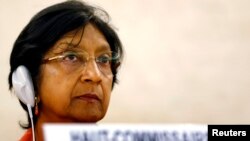The U.N. High Commissioner for Human Rights recently criticized the international community for failing to stop widespread abuses. Navi Pillay said governments too often place more importance on politics than human rights. She spoke last week to the 47-member U.N. Human Rights Council. It was her final speech to the Council as high commissioner for human rights.
In September, Ms. Pillay will have served six years in the position. During that time, she has repeatedly spoken up in defense of human rights causes. She often angered countries by putting pressure on governments she believed were guilty of abuses.
In her final speech to the Council, she deplored the condition of human rights around the world.
“Regrettably, the international community remains unable to consistently react strongly and quickly to crises, including situations of grave human rights violations with high potential for regional overspill.”
Navi Pillay went to South Sudan in April, a week after widespread violence and killings there. She said she was shocked by the targeted ethnic attacks and risk of widespread food shortages there. She said she was also angered by what she believed was the lack of interest by the leaders of both sides of the conflict. She has also been critical of the widespread violence in the Central African Republic.
In her speech, Ms. Pillay described the violence in Syria as a tragedy for the Syrian people and a tragic failure for the cause of human rights. She said the bombings, widespread loss of life and heavy damage to public services in some areas of the country should anger everyone. And she deplored what she described as the refusal by Syria’s government and some opposition groups to seek a peaceful end to the war.
“External powers continue to fuel this violence through the supply of arms, military and other material assistance, as well as inflows of foreign fighters. It is shocking that war crimes and crimes against humanity have become commonplace and occur with complete impunity. I am disappointed that the Security Council -- with 13 votes in favor and 2 opposed -- has been unable to reach agreement on action to ensure accountability for such crimes.”
Russia and China have vetoed U.N. Security Council resolutions on the Syrian conflict. The resolutions would have sent the cases of Syrian officials suspected of war crimes to the International Criminal Court.
In her speech, Navi Pillay said violations of human rights involve more than just large-scale abuses. She said human rights begins and ends with the individual. She spoke about the kidnapping of hundreds of schoolgirls by Boko Haram militants in Nigeria. And she talked about the killing in Pakistan of a 23-year-old pregnant woman by her family.
The next U.N. high commissioner for human rights will have to deal with the situation in Ukraine, among other issues. Ms. Pillay leaves as the U.N. prepares to open an office in South Korea to record widespread abuses in North Korea. Her office is also investigating human rights abuses said to have taken place in the final days of Sri Lanka’s civil war with the Tamil Tigers. The Sri Lankan government has said it will not cooperate with the investigation.




